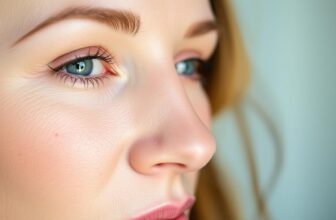
The Ultimate Guide to Anti-Aging Face Creams: What Works and What Doesn’t
As we age, our skin undergoes a myriad of changes. Fine lines, wrinkles, loss of elasticity, and dullness become more pronounced, prompting many to seek solutions that promise youthful, radiant skin. Among the most popular remedies are anti-aging face creams. But with thousands of products on the market, how do you determine which ones are genuinely effective? This comprehensive guide explores everything you need to know about anti-aging face creams, including ingredients that work, those that don’t, how to use these products effectively, and how to choose the best option for your skin type.

1. Understanding Skin Aging
Before diving into products, it’s essential to understand why our skin ages. Aging can be categorized into two types:
- Intrinsic Aging: This is the natural aging process controlled by genetics.
- Extrinsic Aging: Caused by external factors like sun exposure, pollution, smoking, and diet.
Over time, the skin produces less collagen and elastin, leading to sagging and wrinkles. The cell turnover slows, and moisture retention decreases, contributing to a rough texture and dull appearance.
2. Key Ingredients in Effective Anti-Aging Creams
The efficacy of an anti-aging face cream largely depends on its ingredients. Here are some powerhouse components to look for:
a. Retinoids (Retinol, Retinaldehyde, Tretinoin)
Proven to boost collagen production, improve cell turnover, and reduce the appearance of wrinkles and fine lines.
b. Hyaluronic Acid
An excellent humectant that draws moisture into the skin, plumping it and minimizing the appearance of fine lines.
c. Peptides
Short chains of amino acids that help build proteins in the skin such as collagen and elastin.
d. Vitamin C
A powerful antioxidant that brightens skin tone, promotes collagen synthesis, and protects against free radical damage.
e. Niacinamide
Reduces inflammation, improves skin elasticity, strengthens the skin barrier, and helps even out skin tone.
f. Alpha Hydroxy Acids (AHAs)
Exfoliates the skin, encouraging cell turnover and improving texture and tone.

3. Ingredients to Avoid
Not all ingredients benefit aging skin. Some can be irritating or ineffective:
- Alcohols: Can dry out and irritate the skin.
- Synthetic Fragrances: May cause allergic reactions and irritation.
- Essential Oils: Often too harsh and sensitizing for mature skin.
4. Types of Anti-Aging Face Creams
Anti-aging creams can be categorized based on their primary function:
- Moisturizers: Provide hydration and improve skin texture.
- Night Creams: Often richer and contain active ingredients like retinol.
- Eye Creams: Target fine lines, puffiness, and dark circles around the eyes.
- Firming Creams: Aim to restore elasticity and tighten sagging skin.
5. How to Choose the Right Anti-Aging Face Cream
When selecting a cream, consider the following:
- Skin Type: Oily, dry, sensitive, or combination.
- Primary Concerns: Wrinkles, sagging, discoloration, dryness.
- Lifestyle: Choose non-comedogenic products if you wear makeup or sweat frequently.
- SPF Inclusion: Day creams with SPF help protect against sun-induced aging.
6. Application Tips for Maximum Effectiveness
Proper application enhances the effectiveness of anti-aging face creams:
- Cleanse: Always apply to clean, dry skin.
- Tone: Prepares your skin to absorb the product.
- Use Sparingly: A pea-sized amount is often sufficient.
- Layer Correctly: Apply lightest to heaviest; serum before cream.
- Consistency: Regular use over weeks is required to see visible results.
7. Myths About Anti-Aging Creams
Let’s debunk some common myths:
- “More expensive means more effective.” Not necessarily. Efficacy depends on formulation, not price.
- “Natural is always better.” Some natural ingredients can be irritating.
- “Results are instant.” Anti-aging is a long-term commitment.
8. Dermatologist-Recommended Brands
Many dermatologists recommend these scientifically-backed brands:
- Neutrogena Rapid Wrinkle Repair
- Olay Regenerist Micro-Sculpting Cream
- La Roche-Posay Redermic R
- Skinceuticals A.G.E. Interrupter
- CeraVe Skin Renewing Night Cream
These products contain proven ingredients like retinol, hyaluronic acid, and niacinamide.
9. Lifestyle Factors That Support Anti-Aging Efforts
Topical treatments work best when supported by a healthy lifestyle:
- Nutrition: Eat foods rich in antioxidants, omega-3s, and vitamins.
- Hydration: Drink plenty of water.
- Sleep: Aim for 7–9 hours of quality sleep.
- Sun Protection: Use SPF daily, even on cloudy days.
- Avoid Smoking & Alcohol: Both accelerate skin aging.
10. Final Thoughts: Realistic Expectations and Long-Term Care
Anti-aging face creams can significantly improve skin texture, tone, and elasticity when used consistently and correctly. However, they’re not miracle solutions. Realistic expectations and a holistic approach that includes healthy lifestyle choices and professional skincare when needed will yield the best results.
By choosing the right ingredients, avoiding harmful substances, and committing to a daily skincare routine, you can maintain radiant, youthful-looking skin well into your later years.






